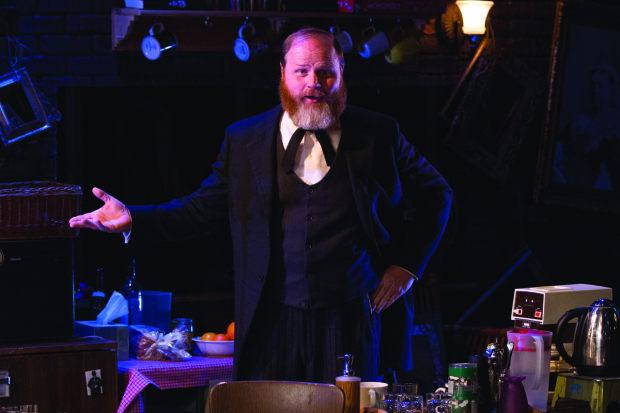No Sisters
Studio Theatre produces a companion piece to ”Three Sisters”.

(© Teresa Wood)
Aaron Posner is clearly one of the cleverest American playwrights working today. With his world premiere production of No Sisters, which he has designed to run concurrently with Anton Chekhov's Three Sisters at Studio Theatre, he provides an amusing comedy involving eight of the Three Sisters' cast. At the same time he has created a companion piece to play that amplifies and explains Chekhov's beloved but dense play.
Three Sisters is performed in a downstairs space at Studio Theatre while No Sisters is performed in a theater one floor above, with both spaces connected by a stairway. When any of those eight actors leave the Three Sisters set and are needed in the No Sisters story, they race up the stairway and enter a new and very different atmosphere. The No Sisters environment is relaxed and modern and includes plenty of expletives and four-letter words.
The closest thing to a major character crossover from Chekhov's play to Posner's is Andréy, the three sisters' brother. At the beginning of the play, he has high hopes of becoming a professor, but a miserable marriage, gambling, and huge quantities of vodka put an end to his dreams. Kulýgin, middle sister Masha's husband, is another life failure who, in Posner's eyes, is almost too good for what life has thrown at him. Whereas in Three Sisters Kulýgin is a buffoon, in No Sisters, he is a generous and smart man who adores his wife even though he knows she has betrayed him. Anfísa, the old housekeeper, is the voice of wisdom in No Sisters, steadying the ship when it begins to rock.
Natásha, Andréy's wife, is as cunning as she is in Three Sisters, but here Posner offers us backstory: She came from a family that was dirt poor, and she was determined to make a better life for herself and her children.
Ryan Rilette is marvelous as Andréy, a buoyant and cheery man, straightforward and joyful as he addresses the audience at the beginning of No Sisters. Gradually, as he fights with his sisters and wife and loses at gambling, Rilette turns miserable and dependent on drink. Madeline Burrows, an understudy, was spectacular in the role of Natásha. Her "mad" scene where she exhibited just how much she simultaneously hates and loves her husband, was performed with just the right mix of passion and silliness.
Todd Scofield brings out all the sensitivity and brilliance in Kulýgin. He remembers his student Natásha, and treats her with more respect than the other characters do. He remains a true Chekhovian "class act." Nancy Robinette, who is kicked around by Natasha in Three Sisters, is sardonic, philosophical, and very funny as Anfísa.
The three soldiers, just rough sketches in Chekhov's original, are fleshed out so that their actions make sense. For one thing, they all love Irína and are in competition with one another. Ro Boddie paints Túzenbach as a truly nice guy who wants to save Irína; he also has a horror of his future – going to work in a brick factory. Biko Eisen-Martin is excellent as the dour Solyóny, who is slightly loony and thinks of himself as a metaphysical poet. William Vaughan is delightful as the young and optimistic Fedótik.
Posner's direction is precise and intelligent. He has his actors do everything that actors in a Chekhovian universe can't do. They speak their minds. They get down on the floor and talk to the audience, asking if individuals are happy. In the process, all the stiffness that holds the Chekhovian world together collapses. Daniel Conway's set is a green room full of things that might be used in a Chekhov production: upholstered chairs, mirrors, many chandeliers hanging from the ceiling. There are three TV monitors set on the left and three on the right of the set and another in the center, so that the actors and the audience can see the performance of Three Sisters going on downstairs. It is a perfectly cramped jungle of Chekhovian symbols. The only thing missing is a samovar. Composer James Barry has created some upbeat music to preface the show and to play during the intermission.
There's a lot to like in Posner's play: some serious philosophy from Kulýgin, Túzenbach, and Anfísa; explanation for why people act as they do; and some suggestion that we haven't traveled far from Chekhov after all. At its roots, the world of No Sisters is just as bizarre, chaotic, and absurd as the world of the Three Sisters.










